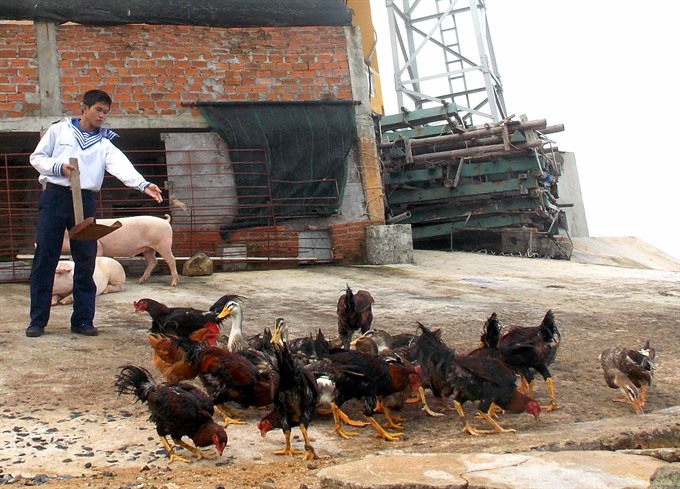 Society
Society

An agricultural waste treatment that uses bioproducts has been developed by scientists from the Centre of New Material and the Hà Nội Gardening Association.
 |
| A Vietnamese soldier feeds cattle and fowl on Đá Lớn Island (internationally called the Discovery Great Reef) on Việt Nam’s Trường Sa (Spratly) Archipelago. — VNS Photo Đoàn Tùng |
HÀ NỘI – An agricultural waste treatment that uses bioproducts has been developed by scientists from the Centre of New Material and the Hà Nội Gardening Association.
Two main inoculants, bactericidal polymer liquid Medipag – 20 and bio-activated powder Bioaktive-Eco, have been compounded by the centre to create a novel method of controling wastewater odor.
Vũ Hoan, president of the Hà Nội Union of Science and Technology Associations, said that this model could replace old waste treatment technologies that use hazardous chemicals. Besides their technological and environmental advantages, the two compounds are affordable.
Bùi Công Khê, director of CNM, said that the method has been used in dairy farms, poultry farms, fish cages and public landfill.
Since 2014, it has been widely adopted in Gia Lâm District’s Phù Đổng Commune and some farms in the districts of Quốc Oai and Sóc Sơn.
The research group also conducted seven training courses for 420 trainees and transferred the technology to several other localities.
Đặng Thế Quân, head of Phù Đổng Commune People’s Council, praised the innovations as a useful tool for protecting farming environments.
According to him, the two compounds are effective in sterilising lodgings and feeding equipment, cleaning sewers and reducing waste odour at the 40 dairy farms where they are used, out of the area’s 777.
At pilot spots in the districts of Quốc Oai, Sóc Sơn and Chương Mĩ, the technology is highly rated by farmers for its ease of use and visible effects. According to them, it improves the disease resistance of poultry and cattle, which helps to increase the quality of dairy and meat products.
The technology helped address the pollution in the landfill of Chương Mĩ District’s Quảng Bị Commune and was successfully applied in the Central London Reef in Việt Nam’s Trường Sa (Spratly) Archipelago.
Bioaktive-Eco has been used in livestock farms and Medipag-20 in hospitals and military trenches. Initial results from the experiment showed that the smell of dampness in the military tunnels and trenches was greatly reduced. Mosquitoes and odours in and around drainage channels were also considerably reduced. According to scientists, the two compounds are environmentally friendly and safe.
These compounds are also one of the highlighted products competing in the "Green Trường Sa" Programme in the period 2016 – 2018, launched by the Central Committee of the Ho Chi Minh Communist Youth Union in cooperation with the navy. If a pilot project in two islands of Trường Sa island district yield consistently positive results, the navy will widen the use of the products in other island localities.
Because of its potential, the technology was recognised by the Việt Nam Fund for Supporting Technological Creations (VIFOTECH) in 2016. – VNS




